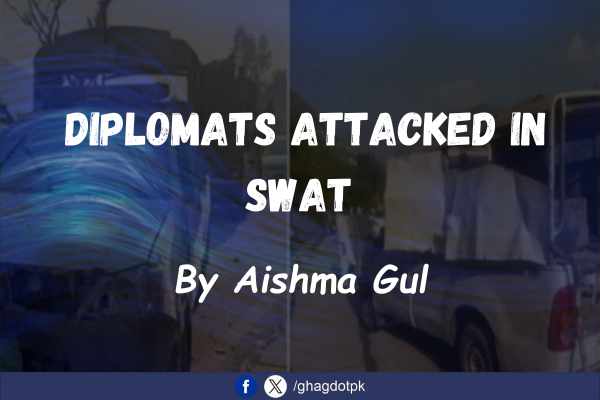By Aishma Gul
When terrorists target foreign diplomats, it is more than just an attack; it is a deliberate attempt to weaken Pakistan’s international status. This nefarious plan was put on full show on September 22, 2024, when a police van in Swat, Khyber Pakhtunkhwa, was hit by a remote-controlled bomb targeting a convoy of international diplomats. While the ambassadors from nations such as Russia, Iran, and Indonesia were unharmed, the attack claimed the life of a brave policeman and left three others injured.
Context of the Attack
The convoy, which included dignitaries from over ten countries, had just left Mingora after attending a Chamber of Commerce ceremony and was on its way to Malam Jabba, a popular tourist location. The incident has sent shockwaves across Pakistan’s diplomatic and security sectors, as international delegations have started visiting the region more frequently in recent years. The security oversight prompted quick action, including the dismissal of Malakand’s Deputy Inspector General (DIG) and Swat’s District Police Officer (DPO), who failed to protect the convoy.
Past Attacks on Diplomatic Convoys and Foreign Nationals
The Swat incident is merely the most recent in a disturbing trend of violence against diplomatic personnel and foreign nationals in Pakistan, notably in Khyber Pakhtunkhwa (KP) and Balochistan.
– 2002 Karachi Consulate Attack: One of the earliest attacks targeting foreigners occurred on June 14, 2002, when a car bomb exploded outside the U.S. Consulate in Karachi, killing 12 people. The attack was aimed at destabilizing foreign relations and creating insecurity for diplomats visiting Pakistan.
– 2013 Consulate Attack in Peshawar: On April 29, 2013, a U.S. consulate convoy was attacked by a car bomb in Peshawar. The attack killed at least 10 people, although the American diplomats survived. The Tehrik-i-Taliban Pakistan (TTP) claimed responsibility, showcasing their ongoing campaign to disrupt Pakistan’s diplomatic ties with the international community.
– 2021 Quetta Serena Hotel Bombing: In April 2021, a powerful blast targeted the Serena Hotel in Quetta, Balochistan, just hours before a visit by the Chinese ambassador. Although the ambassador was unharmed, five people died in the attack. The Balochistan Liberation Army (BLA) was suspected of orchestrating the bombing, as they have repeatedly targeted Chinese interests in the region due to the China-Pakistan Economic Corridor (CPEC).
– 2022 Chinese Teachers’ Attack in Karachi: On April 26, 2022, three Chinese teachers and their Pakistani driver were killed in a suicide bombing at Karachi University. This attack was also attributed to the BLA, which opposes foreign involvement in the region and particularly targets Chinese nationals working on CPEC projects.
– 2024 Swat Ambassadors’ Convoy Attack: The September 22, 2024 attack in Swat marks the latest such incident. The fact that it targeted ambassadors from over ten countries, including Russia, Iran, and Indonesia, further highlights the strategy of these terror groups to create international distrust and isolate Pakistan diplomatically.
The Broader Consequences
These attacks are not isolated acts of violence; they are part of a bigger strategy aimed at destabilizing Pakistan and building a gap between the country and its foreign partners. Terrorist groups target foreign diplomats and citizens to disrupt Pakistan’s international relations, discourage foreign investment, and create an image of an unsafe environment for global engagements.
According to the South Asia Terrorism Portal (SATP), since 2003, over 1,100 foreign nationals have been targeted or impacted by terrorist acts in Pakistan, with KP and Balochistan accounting for a major share of these incidents. The Global Terrorism Database reports that since 2010, there have been over 50 recorded attacks specifically aimed at foreign nationals or diplomatic personnel.
Understanding the Motives
Terrorist groups in Pakistan, including the TTP, BLA, and ISIS, use such assaults to achieve a variety of objectives. Their main aims include:
– Political and Diplomatic Isolation: By assaulting diplomats and foreign nationals, these groups aim to discourage international collaboration with Pakistan, isolate the country diplomatically, and put pressure on foreign governments to cut ties with Pakistan.
– Economic Disruption: Especially in Balochistan, groups like the BLA target foreign nationals involved in infrastructure projects like CPEC. These attacks are designed to deter foreign investments and hinder development initiatives that could stabilize the region.
– Ideological Extremism: Many of these groups adhere to extremist ideologies and resist any foreign presence that they perceive as a danger to their regional control and influence.
Pakistan’s Response
Pakistan’s military and security forces are dedicated to protecting foreign diplomats and visitors, especially in vulnerable areas such as Khyber Pakhtunkhwa (KP) and Balochistan. Following the September 22, 2024 incident in Swat, security operations were increased, emphasizing the continuous threat posed by extremists utilizing Afghan soil to wage strikes against Pakistan. Mumtaz Zehra Baloch, Foreign Office spokeswoman, emphasized this point, which Pakistan has made at the United Nations in appeals for global action against cross-border terrorism.
In response, the Khyber Pakhtunkhwa government established a two-member committee to investigate the incident, and the KP Home Department issued formal orders to strengthen security measures. Military cooperation with law enforcement is vital, with efforts centered on safeguarding transit routes, providing convoy escorts, and improving surveillance to protect foreign dignitaries from such threats.
The Way Forward
The attack in Swat highlights Pakistan’s persistent effort to secure its borders and protect its residents and foreign tourists. While security personnel make tremendous sacrifices, Pakistan must take a multifaceted strategy to combat terrorism’s core roots, including military operations, diplomatic initiatives, and socioeconomic reforms. A stable, peaceful Pakistan benefits not only the region but also the entire international community.






